 Intellectual capital
Intellectual capitalAt Tata Steel, we aspire to be among top five in technology in steel industry globally. Developing technological capability and infrastructure while fostering a culture of innovation is critical to achieving our stated objectives. Further, the pandemic has reinforced the importance of digital technology adoption in creating and unlocking value in the new normal.
New Products Developed
CO2 capture pilot plant commissioned at TSJ
Shikhar25 savings
Patents granted
Impact on SDGs
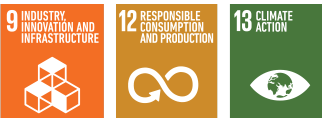
Business Growth
Product and service quality
Technology, product and process innovation
Going beyond compliance and setting trends for future regulations
Water consumption & effluent discharge
CO2 emission
Circular economy
Enhancing customer experience and engagement using digital technology
Focus on technology, digital and disruptive innovation complementing a culture of continuous improvement
Addressing environmental concerns by developing and implementing breakthrough technologies progressively at scale
Building a technology enabled and sustainable business portfolio, enhancing knowledge based differentiation
A key aspect in our technology leadership journey is the breakthrough projects in Technology Leadership Areas. We continue to make strong progress on projects aimed at utilising low-quality raw materials, new and innovative coatings on steel, development and deployment of carbon capture and usage technologies, generation and use of hydrogen in steel value chain, materials for mobility of the future, and water efficiency
We are leveraging in-house capabilities as well as external expertise through strategic collaborations to build an ecosystem which can accelerate deployment of breakthrough technologies at scale. A core team comprising Ventures, Innoventure and Alliance Management is working to enable this.
During the year under review, a Memorandum of Understanding was signed with the Council of Scientific and Industrial Research on setting up a Centre of Excellence in carbon capture and utilisation. Multiple start-ups have also been on-boarded to accelerate our technology journey. Incubation of in-house IP has resulted in steelmaking slag being commercialised as a soil conditioner. Branded as Dhurvi Gold, it has witnessed an encouraging customer response during pilot sales. A separate business unit, Tata Steel Industrial Consulting (TSIC), has been set up to monetise in-house knowledge and expertise.
Breakthrough Consumer-In Innovation remains a focus area for Innovent, which incubates and implements new business ventures centred around latent consumer needs and white spaces. During FY 2020-21, Tata Steel added various new solutions in line with the Innovent motto, ‘Creating Next Gen Solutions – Personalised and Sustainable - with Access to All’. Green Construction Blocks, which enhances speed of construction and adheres to green building norms, was piloted in four markets in India with encouraging sales. The drive towards sustainability in Urban Infrastructure and Rural segments also continued with solutions such as ChargeNest (EV Charging Infrastructure) and AgroNest (Smartwarehouse for prolonging onion life) test marketing with various customer segments. Lumiere French Doors was commercially launched and added to the portfolio of homemaking products. The development and incubation process continued with portfolio of new solutions. Innovent is also spearheading TomorrowLab – an exciting competition platform that saw 181 in-house teams participate with out-of-the-box ideas over three months. These efforts have resulted in recognition within and outside Tata Group with 11 innovation awards from Golden Globe Tigers, Business Leadership and Innovista.
Our strong R&D team with specialisation in multiple fields has delivered on several projects in the domains of sustainability, cost reduction and new product development. A pilot plant of 5 tonne per day has been successfully commissioned at Jamshedpur to capture CO2 from blast furnace gas.
The captured CO2 is being utilised for water treatment at a steel making unit. Laboratory scale studies have shown the possibility of producing electric vehicle battery materials from lowgrade manganese ore. A pilot plant to upscale the process is underway. We have successfully developed a nanoparticle embedded polymeric Ready-to-Paint coating on steel. This is new to the world, eliminates multiple steps in the customer’s line and adds important additional properties to the steel surface without sacrificing formability. The coating is currently at the trial stage at the customer end. We have developed a ‘new to the world’ advanced high strength steel for automatic wheel disc application. Along with high strength, the material possesses high stretch-flangeability (formability) which will help wheel disc manufacturers produce complex shape and light weight wheel discs.
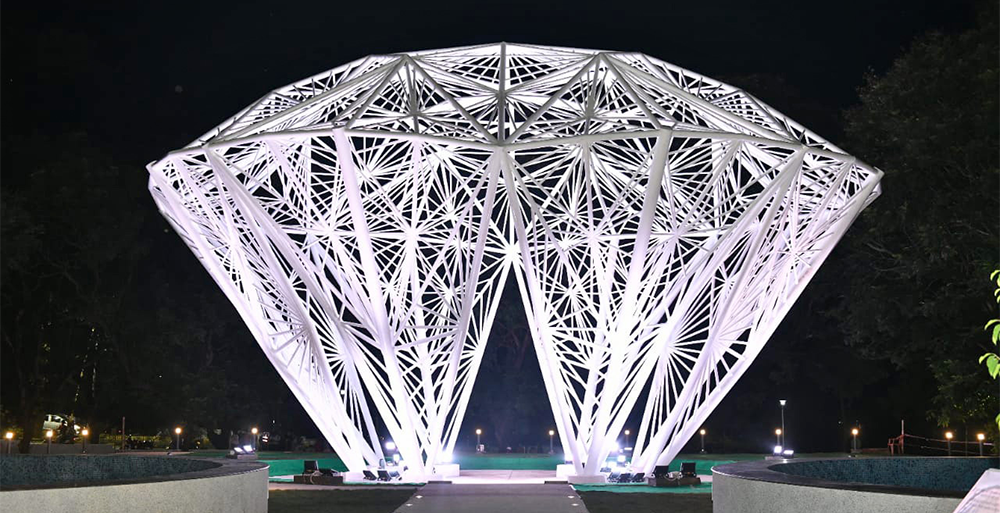
Jamshedpur's Jubilee Diamond at Dorabji Tata Park in Jamshedpur, built using Tata Structura Steel Hollow Sections
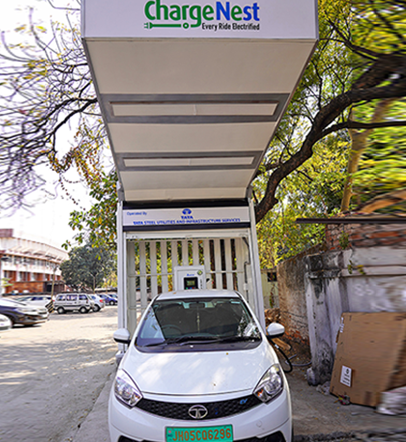
Nest-In's ChargeNest Electric Vehicle charging station in Jamshedpur
The pandemic has changed customer behaviour significantly, and our offerings have been in sync with customer preferences for green products and solutions. We have ventured into developing advanced steel grades for future mobility needs and developing alternatives to imported steel grades in the construction segment.
We have also developed advanced high strength coated steel and obtained DP600GA (Dual Phase Galvannealed) and DP600GI (Dual Phase Galvanised) approvals. We also obtained approval for the passenger vehicle skin panel, a first for Tata Steel, made from bakehardenable steel grade BH180GA.
In long products, we commercialised Fe500 CRS (40mm) which was supplied for constructing the new Parliament House. We have also collaborated with CII Green Business Centre and relevant stakeholders in the Indian Steel sector to develop GreenPro framework for steel rebars, for first time in India. GreenPro Ecolabel enables the endusers to make an informed choice about buying steel having the lowest environment impact.
In the raw materials space, we continue to focus on reducing alumina in iron ore and ash in coal without impacting yield.
New Materials Business (NMB)
NMB was set up with the vision to explore
opportunities in materials beyond steel. During
the year under review, NMB completed its third
year of operation and has currently three material
verticals – Composites, Graphene and Medical
Materials & Devices.
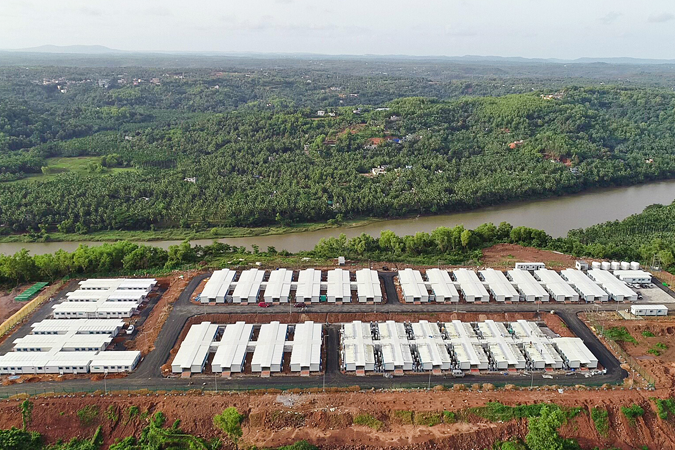
Nest-In provided modular solutions for the 551-bed greenfield hospital at Kasaragod, Kerala
The Composites business of NMB focusses on 3 market segments: Industrial, Infrastructure and the Railways. Current product offerings include:
Industrial
Pressure vessels, tanks, customised chemical handling equipment
Infrastructure
Pipes, poles, smart architecture
Railways
Panels, windows, troughs
In FY 2020-21, the Composites business entered into new products such as isolation cabins, modular toilets and Fiber Reinforced Polymer (FRP) staircase. It also announced itself as an integrated solutions provider to Indian Railways when it delivered a fully furnished first AC coach to Modern Coach Factory, Raebareli.
During the pandemic, NMB in close coordination with the Services and Solutions team worked with group companies to design, build and install a 551-bed greenfield hospital in record time at Kasaragod, Kerala.
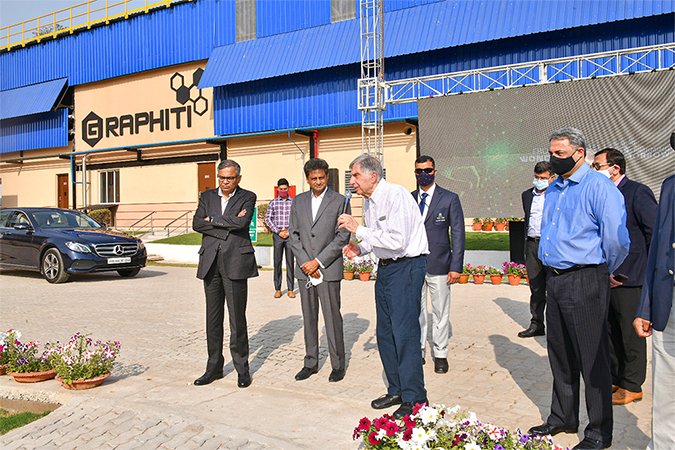
GRAPHITI, a 100-tonne per annum integrated Graphene manufacturing plant in Jamshedpur
In FY 2020-21, we commissioned a 100 tonne-perannum integrated Graphene manufacturing plant. This is one of the largest single unit graphene production centres in the world. Graphene-doped products and graphene-coated products which can be used in diverse sectors such as materials handling, textiles, packaging, among others, are currently being tested and are in different stages of commercialisation.
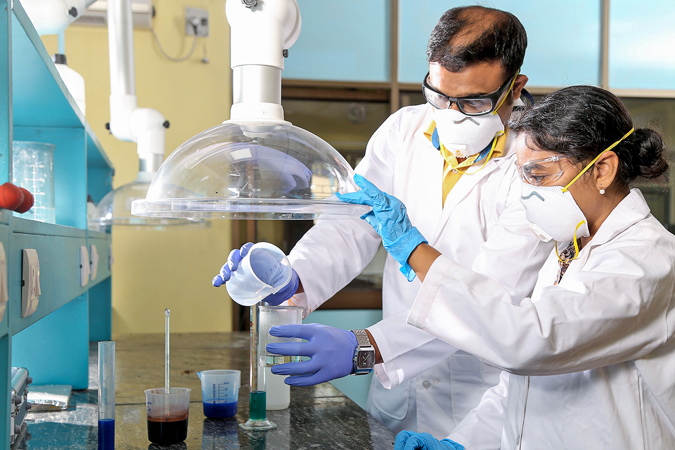
Graphene Lab, Jamshedpur Works
With a vision to create an affordable and global standard health technology solution for India, NMB has ventured into the space of medical materials and devices. The initial focus is on Hydroxyapatite and fish-based Collagen in partnership with two start-up companies. NMB’s ambition is to move up the value chain to medical devices, thereby reducing import dependency in the sector.
At Tata Steel, we have been driving business transformation enabled by digital technologies. Through digital interventions across its value chain, we have been able to drive EBITDA improvements, remodel work practices by enhancing digital maturity and, in the process, have become more insightful, intelligent and agile.
Cloud, Data & Artificial Intelligence (AI) are the building blocks of Tata Steel’s digital transformation journey. We have made substantial investments to augment network, computing, and cyber security capabilities. We have moved ~85% of our servers to the cloud over the last 3 years in one of the biggest cloud migration programmes in Asia. Our cyber security cell is equipped with the necessary expertise and tools to pre-empt cyber threats and intrusions.
The investments made on building a robust infrastructure proved critical during FY 2020-21, when a large part of the organisation was forced to operate remotely due to the pandemic. Without any special efforts, we were able to seamlessly connect to the Company’s network while working from home and continued production even with a skeletal workforce present at the mines and plants. With ~8,000 employees logging into enterprise applications and ~3,500 virtual meetings taking place each day, we were running business as usual with no adverse impact on employee productivity. Through the Suraksha Platform, we ensured health and safety of our employees. Video analytics was used to identify people without face coverings, and pre-empt and detect violation of social distancing at shop floors, canteens and on roads. Suraksha Scanners enabled security personnel at entry gates scan RFID cards through smart phones and extract relevant information on Travel Declaration and Suraksha Compliance of our contract workforce. These initiatives were bundled together and accessed through a single dashboard, thereby ensuring immediate response. Our digital response to COVID-19 was ranked among the top 6% globally by Gartner.
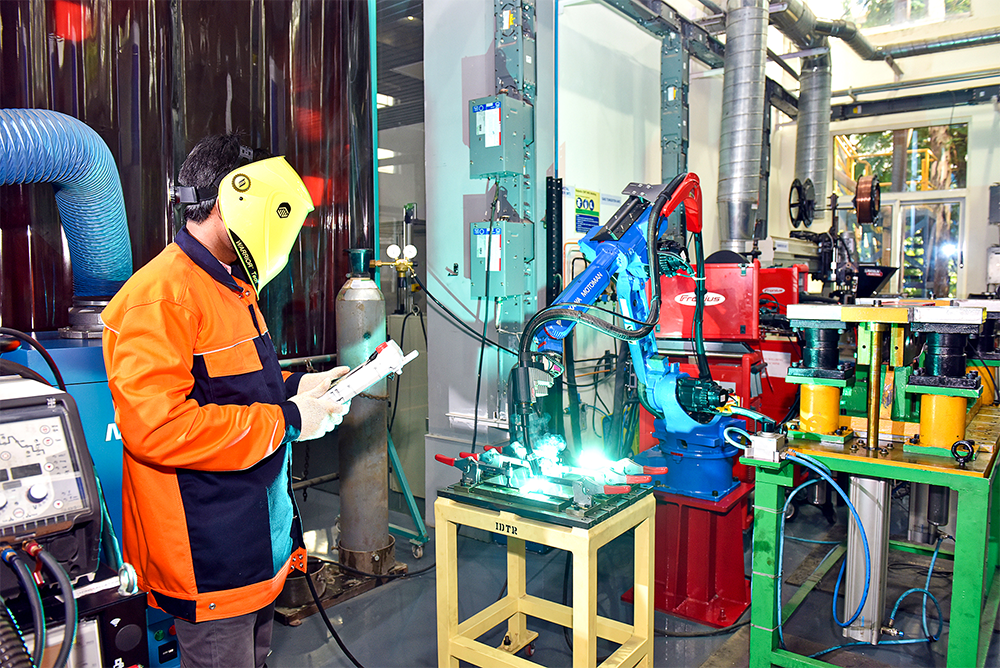
We are also transforming from a process-driven company to a data driven one. The objective is to use data to generate better business insights and drive decision making, coupled with streamlined and robust business processes. As a testimony to our efforts during the year under review, Tata Steel Jamshedpur (TSJ) steel plant was recognised as World Economic Forum’s Advanced 4th Industrial Revolution Lighthouse for showing leadership in applying advanced technologies to drive financial and operational impact. With this, Tata Steel now has three manufacturing sites in the Global Lighthouse network, with Tata Steel Kalinganagar Plant (India) and IJmuiden (the Netherlands) being the other two sites.
Our e-commerce platforms such as Aashiyana, DigECA, and Compass provided alternate channels for driving sales and customer connect. Through digital interventions, we achieved a 30% reduction in customer complaint resolution time. The Vendor Performance Improvement Programme platform which has been designed to cover the contractor workforce in all locations for safety, security and productivity, provides end-toend visibility of work patterns of the workforce across plants and helps preempt unsafe incidents while improving productivity.
To digitally enable operations, Tata Steel has developed multiple assetspecific algorithms to predict failures as well as residual life of equipment. This has minimised failure scenarios for mission-critical equipment and eliminated unplanned downtime. The Smart Asset Maintenance Platform is helping achieve higher asset availability at lower maintenance cost, across equipment from mines to rolling mills through enhanced sensorisation and building predictive analytics solutions.
We have revamped our procurement process by introducing digital catalogue-based buying, commodity price prediction-aided buying, analytics-powered negotiation tools for Category Managers and end-toend contract lifecycle management and analytics. Our Procurement 4.0 platform has enabled ~50% reduction in vendor registration cycle time and ~20% reduction in order processing cycle time.

Total Quality Management (TQM) way of working is embedded in the culture of Tata Steel. TQM techniques are regularly deployed in operations and maintenance processes for achieving consistent quality and efficient performance. Shikhar25 is a focussed EBITDA improvement programme, which promotes efficiency, sustenance and right behaviours across departments of Tata Steel
The programme is aimed at improving operational efficiency, energy efficiency, lower costs, optimise product mix, reduce and recycle waste through impact centres across Tata Steel. During the pandemic-impacted year, we revisited the various aspects of fixed cost to ensure reduced expenditure and maintain healthy cashflow. Also with increased production capacities, the emphasis has been on simplifying and synergising operations across sites for optimal utilisation of resources to reduce cost. During the year under review, a total of 931 projects were implemented and savings of `3,274 crore accrued across the organisation.

Accelerate innovation and technology leadership through strategic collaborations with multiple research and industrial organisations and partnerships with start-ups
Grow adjacent revenue streams by commercialising in-house IP and knowledge through new products in new markets and services
Achieve growth in other materials with world class technologies and products